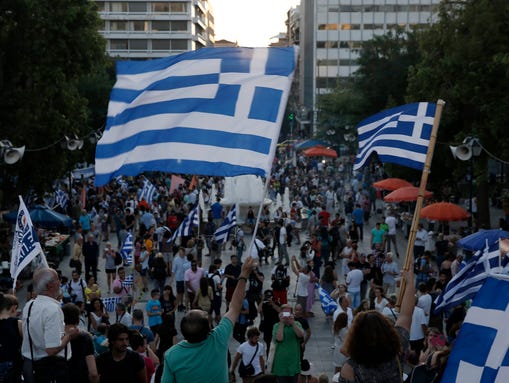Luke Skywalker
Super Moderator
{vb:raw ozzmodz_postquote}:
Get the news
Log In or Subscribe to skip
539 7 [h=6]Share This Story![/h]Let friends in your social network know what you are reading about
[h=4]'No' vote takes lead in Greek bailout referendum[/h]The outcome of an historic referendum on Greece's financial future remained too close to call Sunday, as the nation of 11 million appeared evenly divided over whether to accept onerous terms for a new international bailout or reject those demands for an uncertain fate.
{# #}
[h=4]Sent![/h]A link has been sent to your friend's email address.
[h=4]Posted![/h]A link has been posted to your Facebook feed.
[h=6]Join the Nation's Conversation[/h]To find out more about Facebook commenting please read the Conversation Guidelines and FAQs
[h=2]UP NEXT[/h][h=2]03[/h]
Some 22,000 Greeks for a 'Yes' outcome yelled pro-European slogans just 800 metres away from a rival 'No' rally in central Athens late Friday, two days ahead of a bailout referendum to determine the country's financial future.
Video provided by AFP Newslook
A young boy waits as his grandmother prepares her vote in a voting booth during the Greek referendum in Thessaloniki on July 5, 2015.(Photo: AFP)
ATHENS — Greece on Sunday was on course to deliver a resounding "no" to international creditors' stringent terms for new lending, a historic vote that delivers a blow to European economic unity and cast the nation of 11 million into an uncertain financial future.
With just over half of votes counted, official results from Greece's interior ministry projected that 61% of voters rejected the terms. If confirmed, it will be a far larger repudiation of the strategy of Greece's creditors than anticipated.
Turnout was reported to be high.
As night fell in Athens, thousands of "no" supporters flooded into Syntagma Square in front of Greece's parliament waving flags and banners.
Greece's leftwing government had urged a "no" vote, saying the new tax hikes and benefit cuts demanded by the International Monetary Fund, European Central Bank and European Commission (eurozone governments) were too onerous for a nation that already has suffered a severe, five-year depression, the worst slump of any European nation.
USA TODAY
First take: Greeks tell EU, 'No means no'
Greek Prime Minister Alex Tsipras, whose government was elected this year on a pledge to reject more austerity, called for the referendum in hopes it would persuade the creditors to ease their terms. His opponents say that is unlikely.
But if they stand firm, Greece may be forced to leave the eurozone and replace the euro with its greatly devalued former currency, the drachma. Such an unprecedented move in the history of the eurozone would make Greek exports cheaper but boost the cost of imports and leave the government without funds to pay for everything from basic services to retiree pensions.
Supporters of the No vote wave Greek flags in Syntagma square in Athens on July 5, 2015.<span style="color: Red;">*</span>(Photo: Petros Giannakouris, AP)
Millions of Greeks voted Sunday in the tightly contested referendum and the outcome of the vote could have far-reaching, but also unclear, consequences for markets and economies around the world.
Investors in Asia will get the first opportunity to react to the news when markets open there later Monday. The euro was forecast to start trading about 1% lower against the dollar.
USA TODAY
Wall Street's vote: 'Yes' in Greece referendum
In a post-vote news conference, Greek Finance Minister Yanis Varoufakis nevertheless said he would work with Greece's creditors to find common ground and cut a deal as soon as possible.
Earlier Sunday, Tsipras urged Greeks to vote "no," arguing that a rejection would give his administration a more robust mandate to negotiate better terms for Greece.
"No one can ignore the message of determination of a people taking its destiny in its own hands," Tsipras said after casting his vote. "Today democracy conquers fear," he said.
USA TODAY
Greeks face only bad choices on eve of historic vote
At a polling station in central Athens, a throng of "no" voters cheered when Tspiras cast his ballot.
But in the western Greek city of Patras, housewife Anna Roussou, 45, said she voted "yes" to the austerity terms for getting new loans. "I have three children, I cannot take the risk" of voting against the bailout terms, she said. "Banks are closed. I cannot feed them. Revolution is great, but only when you have the right weapons and friends."
Dimitrios Karamanolis, 70, a farmer from Patras who voted "no," said: "I'm scared, I can't get my pension. I normally get 400 euros (a month, about $440) after 40 years of hard work, now they give me 120 euros. The best I can do for my son, my daughter and my grandchildren is to vote 'no.' "
The referendum is taking place after Greece's banks shut last week to prevent mass withdrawals. ATM cash withdrawals also were limited as Tsipras tries to prevent Greece's economy from collapsing.
Greece's $270 billion financial-crisis-era bailout package expired on Tuesday, the same day Athens missed a $1.8 billion loan repayment to the IMF.
A man leaves a cabin before casting his vote at a polling station in Athens on July 5, 2015<span style="color: Red;">*</span>(Photo: Emilio Morenatti, AP)
Without a fresh injection of funds, Greece's banks could run out of money as early as Monday if the ECB pulls the plug on an emergency borrowing facility it has provided to Greece's lenders. That decision may be linked to what happens in Sunday's vote.
"In the current circumstances of great uncertainty in Europe and the world, the ECB has been clear that if we need to do more we will do more," ECB Executive Board member Benoit Coeure said Sunday, speaking in France.
German Chancellor Angela Merkel was expected to meet with French President Francois Hollande on Monday to assess the result and eurozone finance ministers may also hold discussions.
On the last day of campaigning on Friday, the rival sides held rallies in Athens. There have also been rallies in support of the government's position in Dublin and Lisbon. Both Ireland and Portugal received international bailouts to stave off bankruptcy.
USA TODAY
Greece's debt-crisis road is long and winding
Hjelmgaard reported from London and Skoulis from Patras.
0) { %> 0) { %>
0) { %>
Powered By WizardRSS.com | Full Text RSS Feed
